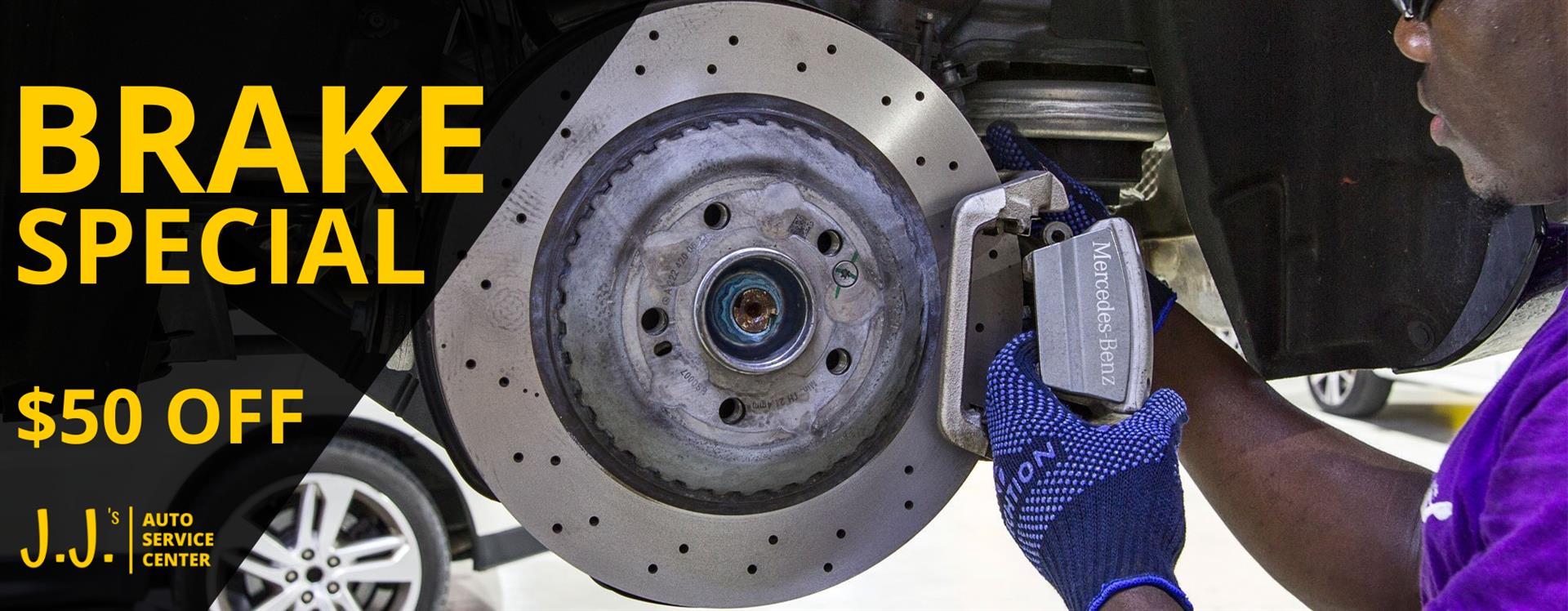8 Signs You Need New Brakes Soon
Common Signs of Brakes in Need of Replacement
Your vehicle's brakes are one of its most critical safety features. Your brakes not only allow you to stop your vehicle safely but also ensure smooth handling and full control over your speed and maneuvering while on the road. It is essential to know the warning signs of brakes in need of replacement. If you start noticing any performance issues with your vehicle, perform a quick inspection, and check for the following warning signs from J.J.'s Auto Service Center in Waldorf, MD to see if your brakes need attention.
One: Visual Signs Of Brake Problems
For most vehicles, you can visually inspect the brake pads through the spokes of the wheels. Upon looking closely into your wheel, you should see the brake pad pressed up against a metal rotor around the inside of the wheel. If you see less than one-quarter of an inch of brake pad in this space, it is probably time to have new brake pads installed.
Another visual check you can perform is a scan of the surface where you park. If your vehicle is leaking brake fluid, this fluid may appear like typical motor oil without the trademark shimmer that motor oil displays when laying in a puddle. Leaking brake fluid requires immediate attention from a professional mechanic.
Two: A “Sinking” Brake Pedal
When your brake pads are in good shape and your brake fluid system is working correctly, you should feel some resistance when you apply your foot to the brake pedal. However, if the brake pedal seems to “sink” into the floor of your vehicle when you brake or feel way too easy to push it all the way down, you probably have a leak in your brake fluid lines.
Three: A Shrieking Shim
Brake pad manufacturers install small strips of metal into most brake pads called shims. You can think of these small pieces of metal as early warning systems for your brake pads. They are designed to produce a high-pitched screeching sound as they rub, providing the driver with an auditory indication that the brake pads are almost at the end of their functional lifespans. You should be able to hear this noise while the vehicle is running, and the windows are up. If you drive while listening to your car stereo, it may be harder to notice.
Four: Your Vehicle “Pulling” To One Side When Braking
If you apply your brakes on the road and your vehicle seems to pull to one side or the other, this is a likely sign that there is a problem in your brake fluid system. This could also indicate that your vehicle's brake pads are wearing unevenly. Your vehicle may require a brake alignment or an inspection of your fluid system, potentially to have it flushed so any foreign matter can be safely removed.
Five: An Awful Grinding Noise
Failing to notice early warning signs that your brake pads require replacement could eventually lead to them wearing down completely. If this occurs, the brake discs and calipers will grind against each other. This metal-on-metal sound is not only loud and alarming but also a sign that your rotors may be damaged. The grinding will wear down your rotors' surfaces. A mechanic may tell you they need to be “turned” to restore their surfaces to an even texture. In some cases, you may need to replace the rotors completely.
Six: Frightening Vibrations
If you drive a vehicle with anti-lock braking installed and have ever needed to panic stop, you probably know how it feels when the anti-lock braking system kicks in and your vehicle vibrates roughly until it comes to a halt. Grinding rotors can produce a similar effect. If you feel this kind of vibration and your ABS light does not engage, your brake rotors have probably been warped by extreme friction.
Seven: Slow Braking
Have you owned your vehicle for quite some time? If so, then you probably know how it feels to brake under normal circumstances. Over time, you may start noticing that your vehicle seems to require more time and distance to come to a complete stop. If your vehicle seems to take much longer to completely brake than it used to, consider this a sign that your brakes need attention.
Eight: A Violently Vibrating Brake Pedal
When you apply your foot to the brake, does the brake pedal seem to vibrate or shake violently? Many brake pads include a specialized binding resin that holds them together. As a pad wears down over time, this resin heats up and smears around the surface of the rotor. Typically, this happens evenly over the entire surface of the rotor that comes into contact with the brake pad in a process most mechanics call “glazing.” However, if the pad overheats, this “glaze” may not develop evenly and will cause the brake pedal to shake and vibrate when used.
Contact J.J.'S Auto In Waldorf Now
These are a few of the most common ways to determine if your vehicle needs brake services. If there is ever any doubt, remember that your brakes are one of the most important safety features of your vehicle, so do not allow these brake repair signs to go unaddressed for long. If you need brake services in the Waldorf, MD area, contact J.J.'s Auto Service Center and schedule an appointment with one of our mechanics.
